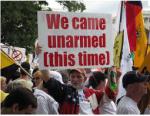Firmin DeBrabander teaches philosophy at Maryland Institute College of Art. Which makes him about the most unlikely person to write a book about guns. But he has written a book about guns, Do Guns Make Us Free? Democracy and the Armed Society, and the title neatly sums up what the book is all about. Actually, the book isn’t really about guns so much as it’s a discourse on political theorists and philosophers whose writings contain discussions about the role of arms in defining the relationship of the citizenry to the ruling or governing class.
 The text abounds with references to the classic writings of Locke, Machiavelli, Hobbes and more recently, Michel Foucault, John Dewey and Hannah Arendt. DeBrabander describes, in detail, how ‘freedom’ on the one hand and gun ownership on the other often appear to be conjoint concepts but, in fact, are often contradictory and work at cross purposes to each other. Basically the author argues that promoting the idea that guns keep us ‘free’ by protecting us from government tyranny, the gun lobby is, in reality, increasing the possibility that freedoms will be lost as the government finds itself facing an increasingly armed and potentially violent citizenry. He also paints a disturbing picture about how increased government War on Terror surveillance has largely passed unnoticed by the pro-gun community, notwithstanding their alleged concerns about loss of ‘freedoms’ when anyone talks about controlling guns.
The text abounds with references to the classic writings of Locke, Machiavelli, Hobbes and more recently, Michel Foucault, John Dewey and Hannah Arendt. DeBrabander describes, in detail, how ‘freedom’ on the one hand and gun ownership on the other often appear to be conjoint concepts but, in fact, are often contradictory and work at cross purposes to each other. Basically the author argues that promoting the idea that guns keep us ‘free’ by protecting us from government tyranny, the gun lobby is, in reality, increasing the possibility that freedoms will be lost as the government finds itself facing an increasingly armed and potentially violent citizenry. He also paints a disturbing picture about how increased government War on Terror surveillance has largely passed unnoticed by the pro-gun community, notwithstanding their alleged concerns about loss of ‘freedoms’ when anyone talks about controlling guns.
This book is the latest attempt to examine the motives and thoughts of gun owners from a cultural point of view. DeBrabander is aware of Dan Baum’s book, Gun Guys, A Road Trip, which he references at length, but he published too late to include Jennifer’s Carlson’s book, Citizen Protectors, The Everyday Politics in an Age of Decline, which takes up where Baum left off. These two books share a common theme, namely, the idea that people who identify themselves through their ownership and use of guns are not just ‘nuts’ or ‘weirdos,’ but are making an objective and conscious choice to define their lives through immersion in the gun culture, which invariably means walking around armed.
All three books make the argument that members of the gun culture agree that carrying a gun is an expression of their ‘freedom,’ but DeBrabander’s book is the only contribution to this genre that attempts to view the concept of ‘freedom’ through a two-dimensional lens. One dimension is created by taking these gun owners at their word which basically means listening to a jumbled argument about the no-good government which is a mélange of Tea Party, Limbaugh and Fox News. The other lens is the anti-government philosophical tradition that comes out of Locke, winds its way through populist political eruptions like Shays’ Rebellion and now is manifested in the rhetorical anger of the Occupy movement.
But what sets the pro-gun movement apart from other expressions of anti-government dissent, according to DeBrabander, is the fact that it is armed, and in that respect becomes a threat to the peaceful and orderly demonstration of free speech and free expression on which a true democracy depends. It is the potential for violence and the frequent calls for violence that lead DeBrabander to insist that guns make us less, not more free. It’s an interesting and provocative thesis, and makes this book a different and much more interesting text than other books that try to explain gun culture to the literate (read: non-gun) crowd.
I’m going to give this book five stars but there’s one point that needs to be raised. The NRA does a masterful job using the member’s love of guns to wrap their support around other socio-political issues, but there are many people who hate taxes, hate Obama, hate liberals, but don’t necessarily own guns. To solve the problem of gun violence, we need to figure out why some folks do and some folks don’t. Because people who believe that guns are the answer to their greatest fears need to see that those fears are shared by others who don’t need to pick up a gun.
Leave a Reply